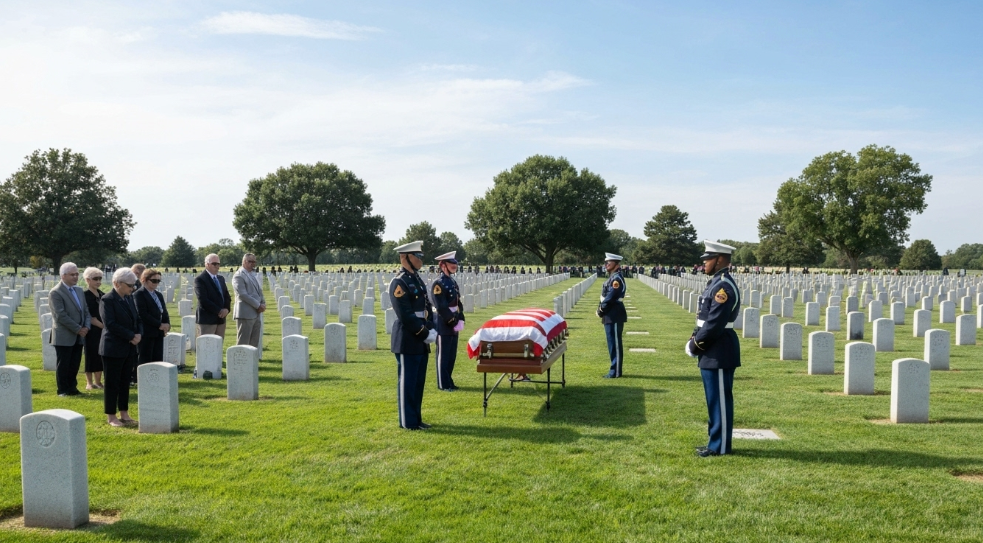How to write a Eulogy for Dad - Meaningful Tips

How to Write a Eulogy for Dad: Meaningful Ideas
Key Highlights
- Writing a good eulogy for your dad means selecting the right words and personal anecdotes to capture his life and legacy.
- Structuring your father’s eulogy with a clear outline ensures it honors his journey and connects with family members.
- Gathering stories from friends and relatives enriches your tribute, making it meaningful and authentic.
- Balancing length and content in your funeral speech helps you create a fitting tribute without overwhelming the audience.
- Practicing the eulogy beforehand builds confidence and emotional stability during delivery.
- Inspiring sample eulogy examples for fathers offer ideas to guide your own heartfelt writing.
Introduction
Losing your dad changes every part of your family life, and honoring him through a well-crafted eulogy can feel overwhelming. Writing your dad’s eulogy is a chance to share his story, celebrate his character, and bring comfort to those mourning. Whether you’re preparing a funeral speech for the first time or trying to find the right words, this guide offers practical advice and meaningful approaches for remembering your father and acknowledging the role he played in your family and community.
Understanding the Purpose of a Eulogy for Dad
Paying tribute to your dad with a eulogy is about more than listing life events; it’s a way to honor his legacy and show how much he meant to your family. Your father’s eulogy should reflect his journey, the values he shared, and the special moments spent together. If you’re unsure where to start, think about what made him unique and how he touched the lives of those around him. This is your opportunity to honor his memory in a way that feels true to both him and your own family.
Let’s explore how you can structure your father’s eulogy to ensure his legacy is celebrated and mourners feel comforted.
Honoring Your Father’s Legacy
Celebrating your dad’s life in a eulogy means looking beyond dates and achievements; it’s about capturing his spirit, his kindness, and the values that shaped your family. Start by recalling defining moments—his first job, favorite hobbies, or the charity shops he supported. Did he teach you a valuable lesson in high school? Was he the one who brought laughter to family gatherings? These memories, big and small, help paint a fuller picture.
Structure your father’s eulogy with a beginning, middle, and end to keep the narrative clear. For example:
- Begin by introducing your relationship and what he meant to you.
- Share stories that highlight his character and lasting impact.
- End with a heartfelt message or a quote that reflects his personality.
Remember, the most fitting tribute comes from honesty and genuine reflection. “A good eulogy tells your story of him,” says Ed Gallois, funeral director. Let your words honor all facets of your dad’s life.
Providing Comfort and Connection to Mourners
When writing your dad’s eulogy, aim to bring solace to the family members and friends gathered. Addressing mourners directly with kind words can be deeply reassuring. Mention the people in his life who mattered most—your mum, siblings, or close friends—and acknowledge their grief. Sharing anecdotes that show your dad’s decency and generosity offers comfort and reminds everyone of his lasting influence.
Gentle humor can help lighten the mood if it feels appropriate. Perhaps recall a favorite joke or a funny family moment that encapsulates his approach to life. It’s okay if your relationship was complicated or distant; you can still find honest ways to express your feelings. Focus on shared experiences, lessons learned, and the ways your dad shaped your family’s story.
Ultimately, your father’s eulogy should foster connection among those present, creating a shared space for remembrance and healing.
Preparing Emotionally and Mentally
Starting to write your dad’s eulogy is an emotional journey. You might find coping with grief difficult while trying to reflect on his life and comfort family members. Allow yourself time to process, and remember that it’s normal for concentration to waver during this period. Many find that setting aside quiet moments for reflection—perhaps with support from loved ones—can help gather memories and stories. Giving yourself permission to grieve is essential as you prepare this meaningful tribute.
Now, let’s look at strategies for handling grief and creating space for reflection.
Coping with Grief While Writing
Grief can cloud your thoughts and make writing a eulogy feel overwhelming. Take breaks when emotions swell, and lean on funeral directors or supportive friends for guidance if needed. Remember, your audience understands the difficulty of this moment. If you attended high school milestones with your dad or shared favorite holidays like Christmas, those memories are valuable, even if recalling them brings tears.
Practice reading your speech aloud, pausing to breathe when emotions rise. “No one expects perfection at a funeral,” notes funeral director Ed Gallois. If you become too emotional, it’s completely acceptable to ask someone else to read your words or to take short pauses. Sipping water and breathing deeply can help manage nerves. The goal is not to suppress grief, but to express it in a way that feels authentic and healing for you and your audience.
Setting Aside Time and Space for Reflection
Finding quiet moments away from daily distractions is key to effective reflection. Consider creating a dedicated space in your home where you can gather memories for your dad’s funeral speech. Bring together photos, favorite keepsakes, and emails from family members who want to contribute stories. If you have your own family, invite them to share their thoughts about what made your dad special.
Use this time to jot down anecdotes, lessons learned, and qualities that defined your father’s life. Reflect on how his kindness or humor shaped your family life. If you struggle to find the right words, step away and return later with a fresh perspective. Allowing space for emotional processing ensures your eulogy will truly honor your dad’s legacy.
Once you have reflected, it’s time to structure your thoughts into a meaningful outline.
Structuring a Meaningful Eulogy
Organizing your dad’s eulogy helps turn memories into a fitting tribute. Begin with a simple outline that guides listeners through his life and your relationship. A good eulogy typically opens with background, moves through personal anecdotes, and closes with heartfelt words. Keeping this structure in mind helps focus your writing and ensures you honor your father’s journey while connecting with family members. A clear outline makes it easier to blend emotion with meaningful facts.
Now, let’s review a practical structure and ways to choose impactful openings and closings.
Suggested Outline and Flow
A well-structured eulogy for your dad should gently guide your audience through his story. Use this suggested flow:
- Introduction: Briefly introduce yourself and your relationship to your father. Share what he meant to you and other family members.
- Life Journey: Highlight key milestones—his childhood, education, career, and family life. Include meaningful anecdotes that illustrate his personality.
- Closing: End with a final message, quote, or lesson that sums up his legacy and your love.
Each section allows you to present memories without overwhelming your audience. Ask relatives for contributions that tie back to your dad’s prominent qualities. “Honesty and warmth make the most memorable eulogies,” says Peggy Noonan, journalist. Let the structure give your funeral speech clarity and emotional impact.
Choosing the Right Opening and Closing
How you start and end your dad’s eulogy is vital. The opening sets the tone, so choose words that acknowledge why everyone has gathered—honoring a beloved father. Thank mourners for attending, and mention those who traveled a long way. An authentic beginning could be a simple declaration: “Dad was always there for our family.”
For your closing, select words that leave a lasting imprint. Share a favorite saying, poem, or lyric that resonated with your father, or offer a personal message of gratitude. “End on a touching note,” recommends funeral director Ed Gallois. A fitting tribute may include thanking everyone for their support, as well as expressing your own love and appreciation for your dad.
A heartfelt opening and closing ensure your funeral speech brings comfort and celebrates your father's life.
Personalizing Your Dad’s Eulogy
Bringing your dad’s life into focus means sharing personal stories and unique anecdotes. Personalizing the eulogy with memories and genuine reflections connects mourners to his character and the impact he had on your family. If you worry about making it too long, select highlights that best represent his spirit. Use anecdotes from your own experiences and invite input from relatives or friends to create a well-rounded tribute.
Next, discover how to weave special stories and contributions from others into your father’s eulogy.
Incorporating Special Stories and Memories
Memorable anecdotes and life stories form the heart of a meaningful eulogy. Choose two or three moments that showcase your dad’s influence and humor:
- Recall a childhood adventure with your dad, perhaps a favorite high school event or a funny Christmas mishap.
- Describe a lesson he taught you that shaped your values or outlook on life.
- Mention his generosity—like volunteering at charity shops or supporting friends in need.
Keep each story concise to avoid a longer eulogy that loses focus. Instead, select those that best reflect your father’s character. If your dad had a saying he repeated or a favorite pastime, sharing this can highlight his personality and bring a smile to listeners. “Anecdotes make a eulogy personal and unforgettable,” says funeral director Ed Gallois. By focusing on key memories, you create a tribute that’s both touching and manageable in length.
Including Anecdotes from Family and Friends
Gathering memories from family members and friends adds depth to your dad’s eulogy. These contributions can capture sides of your father you might not have seen:
- Invite siblings to share their favorite dad-joke or a story that shows his humour and kindness.
- Ask close friends for memories that highlight your dad’s generosity or decency.
- Include stories from your mum or other relatives about meaningful family life moments.
Blending these voices into your speech ensures everyone feels connected, regardless of their relationship with your dad. For daughters, making the tribute personal might mean describing simple acts of kindness or moments when your father showed unwavering support. “Sharing multiple perspectives brings a eulogy to life,” notes Ed Gallois. Use a mix of short anecdotes and heartfelt observations to create a warm, authentic portrait of your dad.
Writing Tips for a Heartfelt Tribute
A fitting tribute to your father should be heartfelt, genuine, and respectful. As you write, focus on kindness and honesty, choosing words that truly reflect your dad’s legacy. Avoid exaggeration—authenticity will resonate most with your audience. Balancing content and length is important, as a longer eulogy can lose impact if it’s overly detailed. Aim to convey the essence of your dad’s life through well-chosen stories, concise reflections, and a tone that honors his memory and comforts family members.
Let’s look at how to keep your eulogy both genuine and impactful.
Keeping the Tone Genuine and Respectful
Crafting a father’s eulogy means speaking from the heart, showing respect, and sharing the truth of your relationship. Use clear, genuine language rather than flowery or generic phrases. Reflect on moments when your dad showed decency or kindness, and don’t be afraid to mention the complexity of his character. If he offered wisdom or humor, weave these traits into your speech for a balanced portrayal.
Respectfully acknowledge both strengths and imperfections. For example, you might say, “Dad wasn’t perfect, but his generosity shaped our family.” Staying honest creates a relatable and heartfelt tribute. Ask a close friend or family member to review your funeral speech for authenticity before finalizing it.
“Warmth and honesty always connect with mourners,” suggests Peggy Noonan. By keeping the tone genuine and respectful, your eulogy will honor your father’s life and support those grieving.
Balancing Length and Content for Impact
Finding the right length for your father’s eulogy is essential. A longer eulogy may overwhelm listeners or dilute key messages, while a brief one might miss important details. Focus on impactful content by selecting stories and anecdotes that highlight your dad’s most defining traits and achievements.
Structure your funeral speech with short sections—each centering on a specific attribute or memorable event. Read your eulogy aloud and edit for clarity and brevity. Remove repetitive or overly detailed passages that don’t add emotional weight. Consider limiting personal stories to two or three, ensuring each one relates directly to your father’s life and the values he imparted.
Remember, a well-balanced tribute creates space for reflection and connection. “Prioritize impact over length for a fitting tribute,” recommends Ed Gallois. By keeping your writing tight and purposeful, you honor your dad without overwhelming the audience.
Delivering the Eulogy with Confidence
Presenting your dad’s funeral speech can feel daunting, especially when emotions run high. Building confidence starts with thorough preparation and practice, both alone and with trusted family members. Speak slowly, breathe deeply, and remember that your audience is supportive—they want to hear your story. Managing nerves and emotional moments helps you deliver a fitting tribute, honoring your father and comforting those present. With the right approach, your words will create a lasting connection.
Let’s explore practicing for emotional stability and engaging with your audience during the service.
Practicing for Emotional Stability
Preparation is crucial for managing your emotions when delivering a eulogy. Practice reading your speech aloud, either to yourself or with a supportive family member. Funeral directors often recommend rehearsing in front of a mirror to build confidence and monitor your emotional reactions. If tears come, pause and take deep breaths—your audience will understand.
Print your speech in a large font or use handwritten notes with plenty of spacing to ease reading. Keep a cup of water and tissues nearby for added comfort. If you feel overwhelmed, know it’s okay to ask someone else to finish reading on your behalf.
Remember Peggy Noonan’s advice: “Eulogies pluck meaning from the fog.” The effort you put in, even through tears, is admired by everyone present. Taking these steps helps ensure you can honor your dad with composure, emotional stability, and grace.
Connecting with Your Audience During the Service
Establishing a bond with your audience during your father’s funeral speech is vital for a meaningful tribute. Begin by greeting mourners and acknowledging their journey—some may have traveled a long way to be present. Speak gently, make eye contact if comfortable, and direct comments to family members and friends who shared your dad’s life.
Sharing acts of kindness or humorous anecdotes can help lighten the atmosphere and foster connection. If emotion overtakes you, don’t rush; take your time to gather yourself, knowing your audience supports you. Use words that invite listeners to reflect on their own memories with your dad.
Express gratitude for their presence, recognizing how much your dad valued his relationships. “A warm audience welcomes genuine words,” says Ed Gallois. By connecting with those in attendance, you transform your eulogy into a shared moment of remembrance and healing.
Addressing Complex or Distant Relationships
Writing your dad’s eulogy may be especially challenging if your relationship was complicated or distant. Focus on forgiveness, shared experiences, and lessons learned, rather than perfect harmony. Honesty and kindness can help bridge emotional gaps for both you and your audience. It’s okay to acknowledge difficulties; your aim is to create a balanced tribute that respects your journey with your father and honors his place in your family life.
Let’s consider practical approaches for finding the right words and highlighting valuable experiences.
Finding the Right Words When It’s Difficult
When honoring a deceased father with whom you shared a complicated relationship, finding the right words can be daunting. Here are steps to guide you:
- Focus on positive qualities, even if limited, such as moments of kindness or decency.
- Address imperfections delicately, remembering that forgiveness is a powerful theme in the grieving process.
- Share memories that shaped your perspective, whether they were joyful or challenging.
Avoid exaggeration and be genuine in your reflections. If you feel uncomfortable expressing certain details, omit them; honesty does not require full disclosure. “You don’t have to say everything,” notes Ed Gallois, funeral director. Instead, aim for a balanced, respectful tribute that acknowledges both the strengths and shortcomings of your relationship.
By approaching the eulogy with compassion and understanding, you foster healing for yourself and those mourning your dad.
Focusing on Shared Experiences and Lessons Learned
Highlighting shared experiences and valuable lessons can bring meaning to your father’s eulogy, even in the face of distance or difficulty. Reflect on moments that shaped your own family life, the lessons your dad taught through actions, and how these experiences influenced your outlook. Use the following table to organize these reflections:
Shared Experience
Lesson Learned
Sunday car washes
Value of routine and responsibility
High school advice
Importance of perseverance
Support during Christmas
Generosity and kindness
Family challenges
Strength through adversity
Select stories from the table to illustrate how your dad’s life impacted you and your family members. Even if your relationship was complex, focusing on these themes creates a balanced and meaningful tribute. Invite others to contribute their own experiences to enrich the eulogy and foster connection among mourners.
Common Mistakes to Avoid in Eulogy Writing
Steering clear of common mistakes ensures your father’s eulogy remains authentic and engaging. Avoid speeches that are too lengthy or overloaded with minute details, as this can reduce emotional impact. Generic language is another pitfall—choose words that genuinely reflect your dad’s life and character. Focus on authenticity, kindness, and clarity to create a funeral speech that resonates with family members and friends, offering a fitting tribute that honors your father’s memory.
Let’s review specific errors and how to express yourself with authenticity.
Overly Lengthy or Detailed Speeches
One frequent mistake in writing a eulogy is making it excessively long or bogged down with minute details. A longer eulogy can overwhelm listeners and dilute the emotional focus. Instead, select two or three key stories that truly capture your dad’s life and character. Practice reading your speech aloud, aiming for a duration of five to seven minutes—most funeral directors agree this length is appropriate for a fitting tribute.
Edit out non-essential information, focusing on stories that highlight your father’s legacy. If you struggle to trim content, ask a trusted family member for feedback. Remember, mourners appreciate concise, heartfelt reflections more than exhaustive biographies.
By keeping your funeral speech focused and impactful, you ensure that your dad’s eulogy is both memorable and meaningful for everyone present.
Generic Language Versus Authentic Expression
Using generic language in a eulogy risks losing the unique essence of your father’s life. Phrases like “he was a good man” or “he loved his family” lack specificity and emotional resonance. Instead, choose details and anecdotes that authentically express what made your dad special. Mention his favorite joke, his generosity at charity shops, or the way he celebrated Christmas.
Authentic expression connects with listeners, offering a fitting tribute that honors your dad’s individuality. Before finalizing your speech, review it for clichés and replace them with personal reflections. “Speak from your own experience,” advises Ed Gallois. Authenticity brings warmth and depth to your funeral speech, ensuring it truly celebrates your father’s life.
Inspiring Eulogy Examples for Fathers
Sample eulogies offer valuable inspiration for crafting your own tribute. Reading examples can help you find the right structure, tone, and approach to honor your dad’s life and family members. A fitting tribute might feature heartfelt stories, reflections on your father’s character, and acknowledgments of those who traveled a long way to attend. Whether you’re seeking a gentle, humorous style or a more formal approach, these examples provide a foundation for your own writing.
Below, you’ll find sample eulogies from a son and a daughter, each offering unique perspectives and expressions of love.
Sample Eulogy from a Son
Dad was my hero, always putting family first no matter how busy life became. He never missed a chance to support those he loved—his work friends, our own family, and even his dog, Buddy. Sundays were spent outside, washing his car, and he greeted every day with humor and warmth.
I’ll miss our childhood trips, the walks, and quiet evenings watching TV together. Dad taught us to “enjoy life,” reminding us that every day is precious. Seeing so many people gathered to say goodbye shows just how deeply he touched others. His pride in us was boundless, and I hope he knew how grateful we are to have had him as our father.
Thank you, Dad, for being the best father anyone could wish for. Your legacy of kindness and family life will live on in all of us.
Sample Eulogy from a Daughter
My father was the foundation of our family—steady, kind, and quietly generous. Growing up, he taught me the value of forgiveness and the strength found in simple acts of kindness. I remember his laughter at Christmas, his gentle encouragement during tough high school years, and the way he always made time for those in need.
Dad’s life was filled with small moments—fixing things around the house, supporting charity shops, and sharing favorite stories. “Kindness is never wasted,” he used to say, and that lesson will stay with me forever.
His memory brings both tears and gratitude. I am proud to be his daughter, and while the loss is immense, I find comfort in knowing that his love shaped our family. Thank you, Dad, for teaching me to see the good in others and to carry your legacy forward.
Conclusion
Writing a eulogy for your dad is a deeply personal journey that honors his life and the impact he had on those around him. It's essential to reflect on cherished memories, share heartfelt stories, and convey your feelings authentically. As you prepare, remember to approach the task with compassion for yourself and your audience. The right words can provide immense comfort, not only to you but also to those who are grieving together. By embracing your emotions and honoring your father's legacy, your eulogy can be a beautiful tribute that resonates with everyone present. Take the time you need to craft a meaningful message, and know that this moment can bring healing and connection. If you need further guidance or support as you navigate this process, please reach out for assistance.
Frequently Asked Questions
How long should a eulogy for my dad be?
A good eulogy for your dad typically lasts 5–7 minutes, balancing heartfelt memories with fitting tribute. Avoid a longer eulogy that overwhelms the funeral speech—focus instead on key moments from his family life and character, creating a meaningful and memorable speech.
What if I become too emotional while speaking?
If emotions overwhelm you during your dad’s eulogy, pause, breathe deeply, and take your time. Practice helps build emotional stability, and funeral directors encourage kindness—your audience understands and supports you. If needed, ask a trusted friend to finish reading the speech.
Are there resources or templates to help me write the eulogy?
You can find eulogy examples and templates online, in charity shops, or through funeral directors. Many websites and email services offer sample eulogies for guidance. Susan and other experts recommend using these tools to help you structure a fitting tribute for your father.
The body content of your post goes here. To edit this text, click on it and delete this default text and start typing your own or paste your own from a different source.
Get a Free Consultation or Contact us Today!
Share










